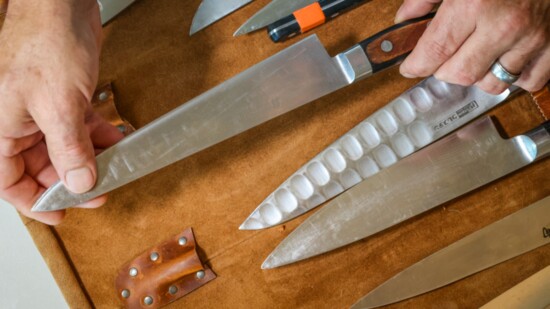In the culinary world, a chef's knives are more than just tools; they are extensions of their artistry and craft. The relationship between a chef and their knives is steeped in history, tradition, and personal significance. We’re diving into the perspectives of two chefs this month, Chef Susan Ellis of The Galway, and Chef John Hamme of Coast Gulf Cuisine; exploring their knife preferences, the significance of these tools, and how they influence their culinary creations.
For many chefs, the choice of knives is a deeply personal journey shaped by experience and necessity. Chef Susan reflects on her knife collection, emphasizing the importance of diversity in their tools. “Each knife I own serves a unique purpose,” she explains, listing a slicer, utility knife, bread knife, and fillet/boning knife. She has curated a selection that blends the best of both worlds, favoring a hybrid of styles. “I prefer the perfect balance for sharpening and ease of use,” they share. The construction also plays a vital role, “my knives are an extension of me and need to be well oiled, sharpened, and ready for work each day.”
Acquiring the right knives is an intricate process that varies from chef to chef. For Chef John Hamme, sourcing their knives has been an adventure. “It’s important to know your knife inside and out. Where does it come from and how is it made. A dull knife is a dangerous knife and that’s why we work with the sharpest blade that’s made for its job. Of course, there are a lot of good quality knives available on the market ranging from home chefs to professional.”
I dove further into questioning the customization for Chefs and their knives. I asked Chef Susan if she’d ever had a knife custom made. “While I haven’t directly had a custom-made knife, I have been gifted a custom-made knife. It’s a beautiful gesture that meant so much to me.” The process of receiving a custom knife is not just about the knife itself; it embodies mentorship and the shared passion for culinary excellence. Custom knives often reflect a chef's personality and cooking style, making them not only functional but also deeply expressive.
Having a personal set of knives is a significant aspect of a chef's identity. “My knife is my tool and unfortunately you don’t see that same mindset and extension so much anymore with some of the younger chefs arriving on the scene.” Chef Hamme asserts. This sentiment captures the essence of a chef's dedication to their craft. Each knife represents years of honing skills, learning techniques, and developing a unique cooking style. The chefs describe their knives as “an extension of their hands,” emphasizing how they facilitate the creation of culinary art.
The influence of knives on cooking style cannot be understated. The precision and control offered by a well-crafted knife allow chefs to execute techniques with finesse. “When I’m using my knives, I’m in my own zone.” This synergy between chef and tool enhances the overall cooking experience, leading to more innovative and expressive dishes. The comfort and familiarity of a preferred knife can elevate the confidence of a chef, allowing them to experiment with flavors and presentations.
Memorable experiences often arise from the intimate relationship chefs have with their knives. Chef Susan recounts a significant lesson learned early in her career: “I once got distracted when cutting and the next thing I knew, I’d gone through my fingernail and hand. Attention to what you’re doing in the kitchen is very important. Not allowing yourself to become easily distracted and learning from this experience that when you do, accidents can happen.”
Chef Hamme says “Not only is a dull knife a dangerous knife but it’s not efficient, one mistake can lead to a bad outcome. It’s a tool that needs to be treated with respect like anything else.” This experience reinforced the importance of knife maintenance, prompting a commitment to regularly sharpen and care for their tools.
Maintaining knives is a ritual that every chef respects. From honing the blades to ensuring they are cleaned and stored properly, attention to detail is paramount. A well-maintained knife will not only perform better but also last longer. This dedication to upkeep reflects their overall approach to cooking; both require patience and respect for the craft. For many chefs, the act of sharpening a knife becomes a meditative practice, allowing them to focus their thoughts and rituals before diving into the chaos of the kitchen.
The bond between chefs and their knives is a rich tapestry woven with history, personal significance, and craftsmanship. These tools are not merely instruments for cutting; they are symbols of dedication, creativity, and growth. As chefs continue to explore new techniques and flavors, their knives remain steadfast companions, guiding them on their culinary journeys. In the world of cooking, the knife is truly an artisan’s edge—sharp, precise, and full of stories waiting to be told. As each knife tells a story, they not only serve as instruments of preparation but also as cherished symbols of a chef’s journey through the culinary landscape.
You can find Chef John Hamme at Coast, Gulf Cuisine at The Beach Club in Gulf Shores and Chef Susan Ellis at the Galway in Gulf Shores. Experience the freshest steaks and Gulf Seafood and traditional Irish Pub fare.
